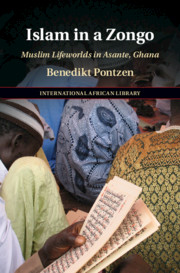Book contents
- Islam in a Zongo
- The International African Library
- Islam in a Zongo
- Copyright page
- Dedication
- Contents
- Figures
- Acknowledgements
- A note on style
- Glossary
- Introduction
- 1 A history of Muslim presence in Asante
- 2 Muslim presence and zongos in Asante
- 3 Those who pray together
- 4 Speaking for Islam
- 5 ‘Bōkā’
- Conclusion
- Appendix
- References
- Other sources
- Index
- Titles in the Series
- Islam in a Zongo
- The International African Library
- Islam in a Zongo
- Copyright page
- Dedication
- Contents
- Figures
- Acknowledgements
- A note on style
- Glossary
- Introduction
- 1 A history of Muslim presence in Asante
- 2 Muslim presence and zongos in Asante
- 3 Those who pray together
- 4 Speaking for Islam
- 5 ‘Bōkā’
- Conclusion
- Appendix
- References
- Other sources
- Index
- Titles in the Series
Summary
The introduction raises the issue of lived Islam’s irreducible diversity. In asking how the anthropology of Islam can descriptively and analytically tackle this diversity, I consider how Muslims themselves conceive, negotiate, and live it. Accordingly, I understand lived Islam as a nexus of people’s religious conceptions, practices, and imaginaries, which they constantly engage with, debate, and (re)make as they live their religion. The introduction first discusses people’s varied conceptions and uses of Islamic prayer beads as an empirical example of lived Islam’s diversity. Then I introduce zongos as Islamic lifeworlds and present their main Islamic groups. Discussing the literature, I locate my book within the anthropology of Islam and introduce the theoretical concept of Islamic lifeworlds. I then discuss the methodology of my empirical research and ethnographic writing, highlighting the biases and limits of my approach, before ending with an outline of the book. The introduction argues that lived Islam is marked by an irreducible diversity that is inherent in and informed by the discursive tradition that people constantly relate to, engage with, and take part in as they live their religion.
Keywords
- Type
- Chapter
- Information
- Islam in a ZongoMuslim Lifeworlds in Asante, Ghana, pp. 1 - 31Publisher: Cambridge University PressPrint publication year: 2021

